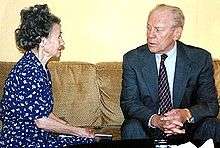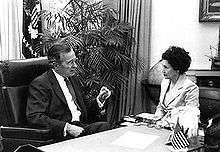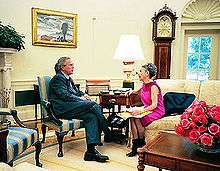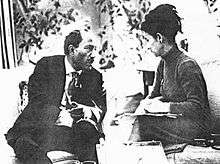Trude Feldman

Trude Feldman (born August 13, 1924) is an American reporter, columnist, and former member of the White House Press Corps and State Department Press Corps. She regularly wrote for McCall's magazine and has written for The New York Times Syndicate, The Washington Post, as well as numerous other media, especially publications for the Jewish community. Feldman has interviewed every U.S. president since Lyndon B. Johnson; and every U.S. vice president from Hubert Humphrey to Al Gore, with the exception of Dick Cheney. She has been a contributing editor for World Tribune.com.[1]
Early life and career
Feldman was born to a Jewish rabbi on August 13, 1924 and grew up in Hollywood, California.[2] Feldman began her career in journalism with the coverage of the trial of Adolf Eichmann 1961–62. She still lives in Washington, DC.
Presidential correspondent



Feldman has interviewed every American president from Lyndon B. Johnson to George W. Bush (including Harry Truman, in his post presidential years (1968, 1971, 1972).
President Jimmy Carter, in a 1977 interview with Feldman, hinted that efforts to promote an Arab-Israeli settlement might have to be suspended.[3] Carter elaborated on this new approach in another interview with her that startled the Arabs. It was a generous face-saving offer to Begin by Carter, giving Israel the opportunity to accept the notions of withdrawal from the West Bank and of participation by the Palestinians in a gradual, limited process of self-determination.[4]
As his 75th birthday approached, Ronald Reagan scheduled an interview with Feldman on the afternoon of Jan. 28, 1986. At 11:38 that morning, however, the space shuttle Challenger disintegrated after liftoff, killing its crew of seven. While the president postponed his State of the Union speech, which had been scheduled for that evening, he didn't postpone the interview.[5]
Feldman has covered George H. W. Bush since he became a congressman from Texas in 1967. She interviewed him as Ambassador to the United Nations, as Vice President, and as President. Her 3-part series — "George Bush at 75" — was published in The Wall Street Journal, Feb. 5, 1996, was internationally syndicated, and was inserted in the Congressional Record by Senators Richard Lugar and Joseph I. Lieberman.[6]
She interviewed President George H. W. Bush January 19, 1993, and again after a 10-day mission to the Middle East.[7]
President Bill Clinton granted his first post-apology interview to Feldman, who did not ask him about the scandal, but about the Yom Kippur tradition of the Day of Atonement.[8]
On August 1, 1996, the Wall Street Journal Opinion Page published a Feldman interview with President Clinton in which he said:
But the truth is, no one knows what the optimum rate of growth without inflation is. The only thing I've tried to do in dealing with the Federal Reserve was to show that I would be responsible in getting the deficit down, but I didn't want to get in the way of economic growth.[9]
In her October 2004, interview with President George W. Bush, he said:
The true history of my administration will be written 50 years from now, and you and I will not be around to see it.[10]
State Department correspondent
Feldman has interviewed every Secretary of State, from Dean Rusk to Colin L. Powell. (Her interview with Condoleezza Rice was conducted in the White House when she was National Security Advisor, soon to become the 66th Secretary of State.)
Middle East writings

Feldman has written from, and about, the Middle East since she covered the 122 sessions of the trial of Adolf Eichmann in Jerusalem. There, and in Haifa, and in Cyprus, she was an 'extra' in the film Exodus. Later, she accompanied former First Lady Eleanor Roosevelt on her five-day Middle East trip – her last before her death in 1962.
On Mideast issues, Feldman has interviewed every Israeli prime minister, including the first, David Ben-Gurion, to Ariel Sharon, with the expectation of Ehud Olmert.
Four months after Anwar Sadat's historical 1977 peace mission to Jerusalem, he and his wife Jehan visited Washington, DC, where both were interviewed by Feldman at Blair House.[11]
Controversy
Feldmen's writings have been generally positive, upbeat, and friendly to her interview subjects. However, they have occasionally ventured into controversial territory. In a December 1985 article for the Dallas Morning News, "McFarlane casualty of power", she reported on the resignation of National Security Adviser Robert C. "Bud" McFarlane, attributing the departure to
...subordinates whose efforts to protect their bosses with excessive zeal often hinder constructive advice and input.
Too often, staff members, rather than working for a high official, act as if they "own" him. Such possessiveness results in abuse of authority, creates obstacles and leads to misconceptions. ...
McFarlane did not volunteer the real reasons — persistent malevolence and belligerancy within the administration which resulted in the undermining of policies.
Her interview articles on the Middle East were not just friendly to Israeli leaders, but to Arab leaders as well, and she gently argued for open dialogue and an even-handed approach to a just and lasting peace in the region.[12]
In March 2001, Feldman was in the White House and composed a note for Press Secretary Ari Fleischer. She walked into his office in his absence to lay the note in his inbox. However, a staffer told her he would not be returning the next day, so she took her note back intending to hand it to him the next time she saw him. This was used as an excuse to suspend her press pass for 90 days and begin a whispering campaign that she was a "security risk" and telling Washington figures "not to talk to her". That informal denial of access continues.[13][14][15]
See also
- J Street
- Brit Tzedek v'Shalom
- Americans for Peace Now
- Jewish Voice for Peace
- Council for the National Interest
- Israel lobby in the United States
References
- ↑ Five Former Presidents and President George W. Bush Salute Gerald R. Ford. Link.
- ↑ The Dance in the Blue Room, Time, Apr. 24, 1964.
- ↑ Israel's Expanding Borders Threaten Peace, David G. Nes, September–October 1977, The Link, Volume 10, Issue 4, Page 2. Link
- ↑ Worldview, "The U.S. and Israel: In the Eye of the Storm", Mark A. Bruzonsky, July 1978.
- ↑ Ronald Reagan and the day the Challenger exploded: A Presidents' Day memoir, Trude Feldman, WorldTribune.com, Feb. 17, 2003. Link
- ↑ Congressional Record, Senate, May 6, 1996, S4725 Link, and again in 1999 Link
- ↑ Former President Bush at 80, Trude Feldman, September 11, 2004 (Updated from June 20, 2004). Link
- ↑ An Interview Coup, Howard Kurtz, The Washington Post, Monday, September 28, 1998, Page C1 Link
- ↑ Memo To: President Clinton
From: Jude Wanniski
Re: WSJournal interview Link - ↑ Interview with President George W. Bush, October 2004. Link
- ↑ From Jerusalem to Annapolis: 30 years later, who will be the next Anwar Sadat? Link
- ↑ Enemies of Hope for a Palestinian State, The New York Times Op-Ed, May 14, 1983. Link
- ↑ Article by Steven Baum on Ethel the Blog, 26 March 2001. Link.
- ↑ Bad News, Good News, Tamara Baker, American Politics Journal, March 26, 2001. Link
- ↑ The Reliable Source, Lloyd Grove, The Washington Post, Mar 23, 2001. Link
External links
- World Tribune.com: Gerald Ford at 90 reflects on his presidency...
- West Wing Story: The Characters Of The White House Press Corps: They May Not Be As Visible As Sam Or Cokie Or Tim, But They'll Put The President On The Spot, Provide Comic Relief And, If You're Not Looking, Rifle Through Your Desk Drawers, Martha Brant | Newsweek Web, May 16, 2001.